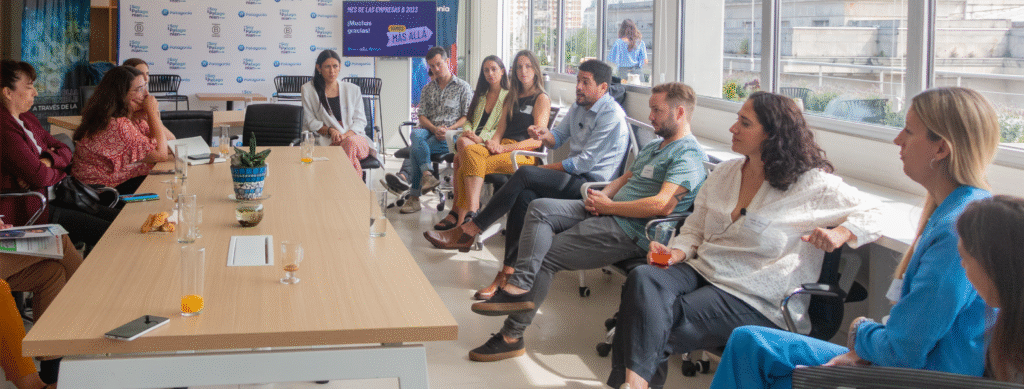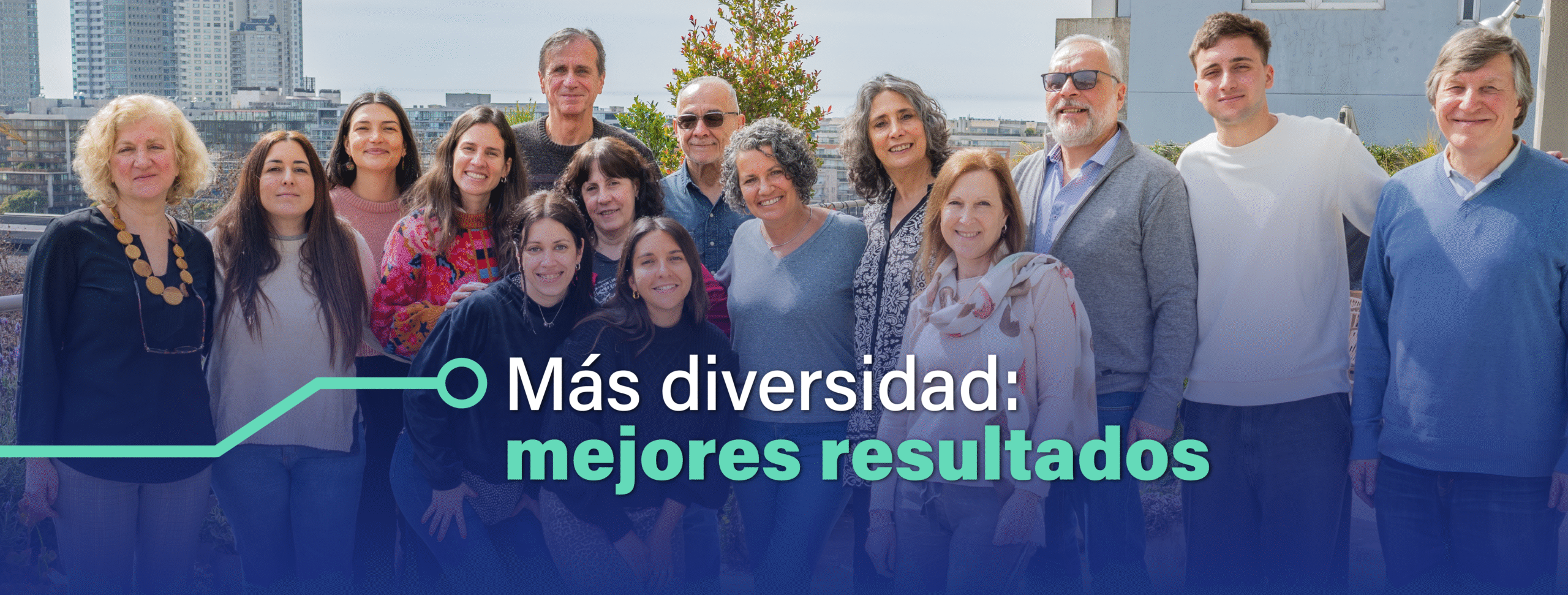Diversity at work: How to avoid the homogeneity trap and boost productivity, competitiveness, and innovation
Diversity in the workplace goes far beyond being an ethical commitment or a cultural value. It is a strategic factor that directly impacts a company's productivity, competitiveness, and capacity for innovation.
A diverse team brings together different perspectives, varied experiences, and complementary ways of solving problems. This diversity creates an ecosystem where Ideas are enriched, challenges are analyzed from multiple perspectives, and solutions are more creative and effective..
It's not just about having more voices, but about how those voices empower decision-making and reduce the risk of falling into a "one-size-fits-all" approach, which limits growth opportunities.
With the aim of delving deeper into the importance of diversity at work for organizations, we spoke with Carolina Olivera, People, Culture and Sustainability Director of IT Patagonia, and an expert in comprehensive talent management with 20 years of experience.
We analyze the differential that diversity brings and the main benefits it offers to business culture and competitiveness. In parallel, we explore the disadvantages of lacking a diverse approach and the consequences it entails.
Impact of diversity on productivity, competitiveness and innovation capacity
From a productivity point of view, it has been proven that Inclusive teams achieve greater commitment and motivationAnd this creates an effect that translates into improved performance and more sustainable results.
In terms of competitiveness, Organizations that promote diversity in the workplace are better positioned in front of clients, partners and markets., which are also heterogeneous and changing.
When it comes to innovation, diversity in the workplace is practically a requirement. The more diverse the perspectives, the greater the likelihood of discovering new ways of doing things and anticipating the needs of the environment.
In short, Diversity at work is not an "extra" on the organizational agenda, but a key driver that transforms businesses into more equitable places, but also more dynamic, resilient, and prepared to compete in a complex world.

What differentials do diverse teams bring to the growth of organizations?
When there is diversity at work, it generates more innovation, greater adaptability, and better decisions.
Diversity—in gender, backgrounds, experiences, and ways of thinking—enriches our understanding of problems and solutions.
In the field of technology, where complex challenges are constantly faced, Diversity of perspectives is key to finding more creative, comprehensive and effective responses.
Furthermore, diverse teams are more representative of the real world—of customers, users, and communities. This allows for the design of more inclusive products, services, and experiences that respond to a diverse audience. There's also the impact on internal culture. When you build environments where everyone can be valued for their talents and contribute from their authenticity, the sense of belonging, commitment and teamwork are strengthened.
"At IT Patagonia, we understand that diversity isn't an end in itself, but rather a way to maximize collective intelligence. And that is, without a doubt, a driver of growth."
Carolina Olivera, People, Culture and Sustainability Director
How does the commitment to diversity translate into day-to-day decisions within the company?
Commitment to diversity in the workplace is demonstrated in everyday decisions, not just in big announcements or policies.
In this sense, True cultural transformation occurs when values become part of how we lead, communicate, decide, and work. every day.
“At IT Patagonia, we live this by ensuring inclusive searches, incorporating women into multiple functions and leadership roles. We also manage generational diversity by listening to experiences and supporting them to empower them,” says Carolina.
Likewise, diversity at work is experienced or lived in our daily lives:
- By putting conversations about bias on the agenda.
- By making visible social problems of underemployment for the transgender community.
- By implementing initiatives that support adjustments for people with disabilities and neurodiversity.
- By empathetically accompanying different personal and family realities.
“When diversity is a real value, it shows in the small gestures, in the decisions that are made even when no one is looking. Because building an inclusive culture is not just a matter of specialized areas, it is a way of being and managing“,” Carolina emphasizes.

The homogeneity trap: disadvantages of not having diverse teams
A company that fails to develop diverse teams can generate multiple disadvantages that affect its internal climate and business sustainability.
Let's look at some of the problems that can arise from a non-inclusive corporate culture:
1. Loss of innovation and creativity
When everyone on a team shares similar backgrounds, contexts, and ways of thinking, ideas tend to be repeated.
This dynamic tends to limit the generation of disruptive ideas and reduces the ability to find original solutions to complex problems.
Innovation arises from contrasting perspectives and the possibility of questioning the established order.
Without diversity in the workplace, the ability to think outside the box is reduced, which can leave the company lagging behind competitors that do incorporate a variety of approaches.
2. Less adaptability to change
The world of work and markets are evolving rapidly. Contrary to this trend, homogeneous teams tend to be more resistant to change because they are not accustomed to incorporating diverse perspectives.
The lack of diversity in the workplace produces the following effects in organizations:
- It reduces the ability to adapt to dynamic contexts and increasingly globalized and diverse markets.
- It prevents the flexibility needed to respond to new challenges, emerging technologies, or social and cultural transformations that impact business.
3. Biased decisions
When a group thinks alike, it's common to fall into what's called "groupthink." A dynamic in which conformity is prioritized and innovative alternatives or critical points of view are sidelined.
Sharing a similar background increases the risk of falling into cognitive biases and always confirming the same views.
This can lead to unrepresentative decisions that fail to consider all stakeholders and produce negative long-term consequences.
4. Difficulties in attracting and retaining talent
People are increasingly looking to work in environments where they value authenticity, inclusion, and growth opportunities.
Companies that don't promote diversity in the workplace send a clear signal to the market: there's no room for dissent and alternative thinking in their structures.
A non-inclusive organizational culture often limits the attraction of qualified professionals and increases turnover, which affects talent management and operational continuity.
5. Disconnection with customers and markets
If teams do not reflect the diversity of society, it will be more difficult to understand the needs of heterogeneous customers, with different cultures, ages, identities, lifestyles and needs.
A team that lacks diversity runs the risk of designing products, services, or communication strategies that don't connect with that heterogeneity.
As a result, the company loses competitiveness and misses out on business opportunities that could be captured by more inclusive organizations. Thus, the negative impact on results is guaranteed.
6. Less healthy work environment
The lack of diversity can lead to more rigid work environments, with less tolerance for differences and less openness to mutual learning.
A work environment with these characteristics negatively impacts people's motivation and commitment. It creates a negative cycle characterized by less enthusiasm, lower productivity, and a greater likelihood of internal conflict or disaffection with the organization.

The virtuous circle of heterogeneity
Diversity at work understood in terms of gender, age, culture, training and experiences, among other dimensions, offers a richness that transcends the individual.
Its effects translate into concrete benefits for business productivity, competitiveness, and sustainability.
Just as we've seen the negative consequences that the homogeneity trap poses for organizations, let's analyze some of the main advantages that workplace diversity brings to companies:
1. Greater innovation and creativity
A team made up of people with different life stories, cultures, and perspectives is more likely to generate innovative ideas.
Innovation rarely emerges in homogeneous environments, where single-minded thinking prevails. Instead, diversity in the workplace fuels creativity by allowing us to question the established order and propose original alternatives. This is key in industries where differentiation is essential for survival and growth.
2. Improved decision-making
Diverse teams tend to discuss and evaluate problems more broadly, considering angles that would not be visible in homogeneous groups.
This multiplicity of points of view helps reduce unconscious biases, detect risks, and anticipate consequences.
As a result, decisions are more robust, better-founded, and more likely to be successful in practice.
3. Increased productivity
When people perceive that their identity and differences are valued, they feel more motivated and committed to the company's goals.
This sense of belonging has a direct impact on productivity and translates into:
- Greater energy.
- Better results.
- A higher level of collaboration among colleagues.
Diversity and inclusion, when managed well, act as catalysts for performance.
4. Greater adaptability and resilience
Business environments are volatile and uncertain. A team made up of people with diverse experiences is more flexible in dealing with the unexpected. It's accustomed to dealing with different ways of thinking and solving problems.
The adaptability that diversity brings to the workplace transforms into organizational resilience, enabling the organization not only to withstand change but also to capitalize on it as opportunities.
5. Attracting and retaining talent
Today, the new generations choose organizations that promote authenticity and inclusion.
A company that promotes diversity in the workplace projects an image of an open, fair, and equitable workplace, which translates into greater attractiveness for talent.
Besides, retains and builds loyalty among its employees, as people tend to stay in places where they feel they can develop without having to hide who they are.
6. Better connection with customers and markets
Today's users and consumers are heterogeneous: They have different values, habits, languages, cultures and expectations.
A diverse team is more representative of that reality and, therefore, better understands the market.
This approach allows us to design more relevant and effective products, services, and communication strategies that create stronger connections with those who use them.
7. Healthier work environment
Diversity in the workplace, accompanied by inclusion policies, creates environments where mutual respect is fostered and differences are valued. As a result, collaboration is strengthened, tensions are reduced, and constant peer learning is promoted.
A good work environment not only improves talent satisfaction, but also impacts productivity and the company's reputation as an employer.
The importance of making diversity at work go viral
Diversity in work teams is not a passing trend, but a sustainable competitive advantage.
Organizations that embrace it become more innovative, resilient, and closer to their customers, while strengthening their internal culture.
In an increasingly complex and plural world, diversity in the workplace is not just a value: it is a driver of growth and differentiation.
If you are interested in working in a work ecosystem that promotes diversity, equity and inclusion, Check out our open searches.
And, if you want to know How we manage diversity at IT Patagonia and the impact that these actions have on the technological solutions we offer to our clients, write to us.

